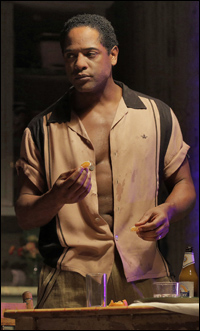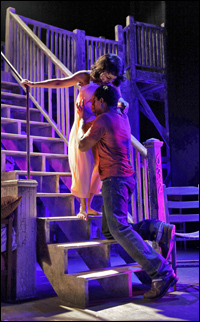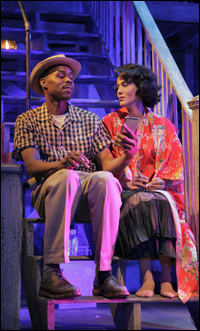
*
The director turns to Blanche and suggests she find a way to make Stella "come to her" and that she make what Stella calls Blanche's "hysterical outburst" play as "more hysterical." Sounds like a typical theatrical moment — a backstage glimpse of a rehearsal for an American classic. And in a way, it's nothing new: A Streetcar Named Desire has already had two major New York productions in the last decade (one on Broadway and Cate Blanchett's memorable Australian import at BAM); before that it was staged on Broadway in the 1970s, '80s and '90s.
But this production, directed by Emily Mann, is different than any on Broadway that has preceded it: the show's producer, Stephen Byrd, and the four leads — Blair Underwood, Nicole Ari Parker, Daphne Rubin-Vega and Wood Harris — are all African-American or Latina. (There have been numerous all-African-American productions away from Broadway's bright lights; the first was in 1953.)
Byrd broke this barrier in 2008 with another Tennessee Williams classic, Cat On a Hot Tin Roof, which starred James Earl Jones, Phylicia Rashad and Terrence Howard. "With Cat there was resistance at every turn," says Byrd, who made his fortune at Goldman Sachs and then tried breaking into movie producing before turning to the theatre instead.
 |
||
| Blair Underwood |
||
| photo by Ken Howard |
With Jones and the Williams estate on board, Byrd still had to persuade investors — no simple feat. But after a lifetime spent pleasing clients, he found this job "viscerally more satisfying. I had passion and courage."
That production shocked skeptics by recouping its investment in 12 weeks and winning the Olivier Award in London. That paved the way for Streetcar.
For both the New York and London productions of Cat, first-time theatregoers comprised a huge percentage of the audience. "It let some people know that they were included in this slice of American pie," says Underwood, who is playing Streetcar's brutish male lead, Stanley.
Read more about the Broadway history of A Streetcar Named Desire in the Playbill Vault.
 |
||
| Daphne Rubin-Vega and Blair Underwood |
||
| Photo by Ken Howard |
But the Streetcar cast is wholly on board. All rave about getting to perform in what Rubin-Vega, who plays Stanley's wife, Stella, calls "a masterpiece of American literature" and are thrilled, as Underwood puts it, to help "push the door open further" for other minority actors.
"This isn't a gimmick," Underwood says, adding that while they don't want to be compared to previous productions — their motto is "This ain't that, though" — they are remaining true to Williams' script. "We're accessing the same words and the same story in a different context, and that has a lot of historical significance," he says. "But we may bring a different type of energy or accessibility."
Parker, who plays the ethereal Blanche, says the show's universal themes remain intact but that the concept of "characters who press on despite despair, heartbreak and disillusionment is something that parallels the history of African-Americans. There are no distortions... It's just a seamless, effortless fit."
Harris, the production's Mitch, says the original music by Terence Blanchard enhances that fit — jazz and blues make the play more specific to New Orleans but also to this cast. "That's our history in the play," he says.
 |
||
| Wood Harris and Nicole Ari Parker |
||
| photo by Ken Howard |
Indeed, none of the cast members think race should be a factor in casting most parts. Harris points out that Marlon Brando, who memorably originated Stanley, wasn't Polish and wasn't from New Orleans; he just acted in a part.
"White people have been playing Othello since the beginning of time without anyone questioning it," Parker says. "I paid tuition at NYU just like the next girl. We sat there and studied Glass Menagerie.
"We're Americans doing an American playwright — my skin color is different, but I'm still part of the fabric of this country, just like you are," Parker continues. "I think Tennessee would be proud."
Rubin-Vega hopes Streetcar steers Broadway down a path to where "this will become an obsolete conversation, where it is natural to have these actors in these roles," adding that she could one day see herself in Death of a Salesman or other traditionally white roles. "At that point, you'll probably be doing this story about Asian or East Indian casts trying to break their own barriers."
But the barriers should come down more and more quickly, Underwood believes. "Audiences are much more open-minded now than they ever were."
(The article appears in the May 2012 issue of Playbill. Want a home subscription? Visit PlaybillStore.com.)










